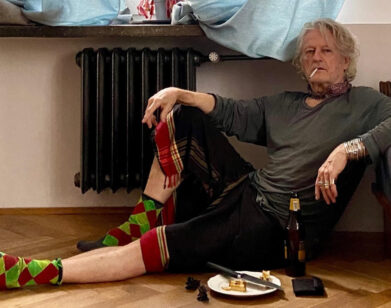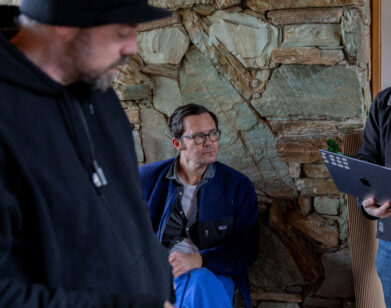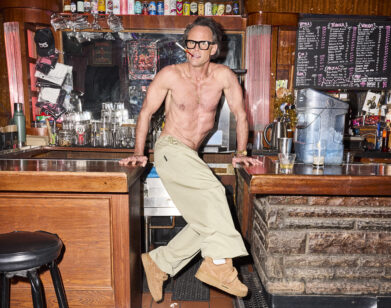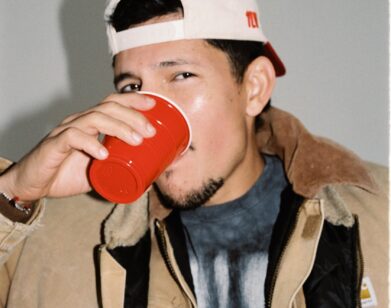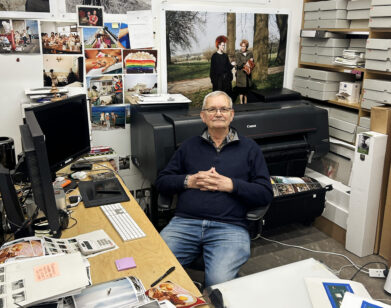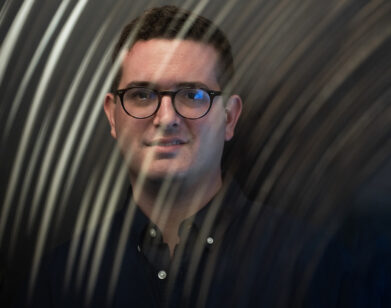Dominic Cooper Goes a Little Bit Rock and Roll
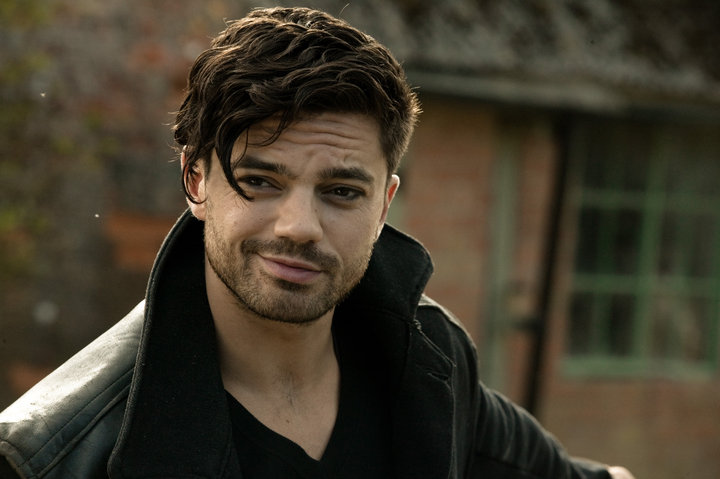
DOMINIC COOPER (AND PUP) IN TAMARA DREWE
After a magnetic debut in Alan Bennett’s History Boys, Dominic Cooper has amassed a fractious resumé, taking on both Hollywood musicals like Mamma Mia and bleak indie dramas like the upcoming Devil’s Double. This week he returns to comedy in the English farce Tamara Drewe. Based on the popular comic strip and graphic novel, the film was directed with Stephen Frears, with the mischievous Gemma Arterton in the title role. Playing the self-absorbed drummer Arterton initially falls for, Cooper manages to skewer the petulant, eye-linered musicians of today with a simple flip of his bangs. In person Cooper is excessively charming, without a hint of attitude or eyeliner. We caught up with him on a particularly rainy day; he talked to us about his ridiculous car and getting thrown out of an audition by Stephen Frears.
MOHNEY: Can you talk about what drew you to the project? Had you read the comic before?
COOPER: I hadn’t, I had no idea about the comic book. It was published in this particular newspaper, which I bought every day—but obviously didn’t open it, which is mildly depressing. I didn’t really know what to make of it when I first read the script. And then we had a read-through in which Steven decided whether he wanted to make it. It completely came to life in that reading, you suddenly got an idea of who these people were and what the story was trying to say. And I had this opportunity to play this fantastically self-obsessed, awful narcissistic rock-‘n’-roll star. I adored Steven’s work for a long time, even though I had a very fractious relationship with him when I first met him. When he ushered me out the door immediately when I went to audition for something told me to “Bugger off.”
MOHNEY: Really?
COOPER: Yep, it was another movie—and he said, “Nope, no, completely wrong, get out! You’ve got short cropped hair.” What did he call me… ‘You look-butch.’ and he said ‘This character’s got lovely, long, flowing, beautiful, curly hair!’ I had a big argument with him; I said “I didn’t come all the way over here for you to just usher me out of the room! I can have long hair! I’m an actor; I have whatever hair you want me to have!” I grabbed his computer and showed him lots of images—none of which were me with long hair. That was our first meeting.
MOHNEY: Did you get to audition?
COOPER: No, but I learned a lot about him in that moment, and actually what’s great about him. He’s completely unprepared to waste my time or his time. He knew I was wrong, therefore what was the point of carrying the meeting on? Which is why I like him. I started getting along really well with him and loved being directed by him… The character was a great opportunity to have some fun with something and do a little comedy.
MOHNEY: And the character you play, you hate him but he’s still very entertaining.
COOPER: Yeah, on paper you just despise him. No one would want to hang out with this guy at all! So I think it was important—he is so dense that you couldn’t feel this sorry for him. He’s just so stupid and simple. He loves his dog, he loves his car, he likes playing drums, and he quite likes having a girlfriend on his arm. He’s very, very simple.
MOHNEY: Did you learn how to play the drums?
COOPER: Yeah, I did for a few weeks with a guy who was in a band I was in. What was great is that my brother did the music for the film. The song at the end, “Jailbreak Jodie”… Stephen came up with that name. Then my brother wrote it in four days and then we recorded it in Abbey Road studios and it sounded awful. So we recorded it in his shed and it sounded really good. But it was such fun working with him after watching him perform for years in all these dens in south London and then performing with him on stage—the experience was amazing, to be performing at a festival, you can see why they have such a great life.
MOHNEY: Does it help you when the story is about going away from the city-does it help when you are interacting with people in this small town?
COOPER: Yeah, they were wonderful. It’s a very different atmosphere when you are in a city where people are just fed up with you… But in the countryside they adored it, and this lovely little couple who lived in the house that we were in every day-they just locked themselves in this room next to the fire. I remember popping in and they seemed terribly happy with it all. They were very interested and excited that their house was being used and there were people in their little village that they live in.
MOHNEY: It’s a beautiful place.
COOPER: It’s stunning isn’t it? That whole area is wonderful. Nothing’s changed, all the hedgerows between the fields are still there. And of course, when you are filming in location, it gives it the essence of what you’re portraying. Except for my character, he loathed it. I was even worse than the character, the character shows up in a bright yellow Porsche; I showed up in bright red Audi R8 sports car-ridiculous car. I realize now, the brother who’s in the band, we used to go on holidays to the south of France. He used to spend hours getting ready into his leather trousers and spraying his great peroxide blonde dyed hair, to go sit next to a river in 90-degree heat all day, and then he writes songs about how dumb the country was. Of course that’s who I had in the back of my head. He looks with absolute disgust on these people in the village who are into book club and baking and he just can’t understand it. So that’s a little bit of my brother I suppose.
MOHNEY: I’m sure he’s happy to hear it.
COOPER: I know! I feel bad, but it’s true.
MOHNEY: In the film, the simple country life is punctuated with the two bored teenage girls living in the town.
COOPER: Yeah, you feel sorry for them, don’t you? And you’re bored when you’re that age anyways. At 16 there is nothing to do if you’re stuck in the countryside.
MOHNEY: How was it to work with such newcomers in addition to such venerated British actors like Roger Allam and Tamsin Greig?
COOPER: It’s the same of the whole feeling of the entire project actually. If you’re made to feel comfortable enough you do your best work. Especially with comedy, you take massive risks because ultimately you’re trying to be funny. If you’re not funny, then it’s really embarrassing and you look stupid. So you have to have confidence in the people around you and your director. You can be prepared for your jump of faith and be as stupid as possible…I think the girls knew exactly those parts they were playing, and you needed to let them run away with it. That’s exactly what Stephen [Frears] did. It was a very comfortable in which to work, and Stephen says very helpful things. He’s an actor’s director-whatever anyone ever means by that-but he’s an actor’s director. He’s not just thinking of the shot and the lighting and the other millions of things…at the forefront of his head is the performance.
MOHNEY: The film might seem like a traditional romantic comedy but it actually goes quite dark towards the end—
COOPER: I think that’s what is great about it. It turns into something totally different. That’s the beauty of this [film]. I didn’t know what this was-I had no idea… It’s snapshots of this very idyllic middle class environment, but what’s going on under the surface is chaos and doom. I think it’s really clever and funny. I think it made Stephen laugh and that’s why he made it.
MOHNEY: In comparison with Stephen Frears’ last film, The Queen, this film seems completely different.
COOPER: It’s so odd. But I think the same way actors are supposed to keep doing different things all the time. It pushes you and challenges you to be more creative, I suppose…He seemed very, very happy when he was making it as well. It was a good environment. We had a lot of fun making it, which isn’t always the case.
MOHNEY: So you’re in the new Marilyn Monroe movie My Week with Marilyn, with Michelle Williams, can you tell me what that’s about?
COOPER: I should be there rehearsing now. [Laughs] It’s a great story… It’s a fantastic moment in history when there was a very fraught relationship between Laurence Olivier and Marilyn Monroe. I’m her agent. They had a very interesting relationship, he loved her at one point but he was quite manipulative because he owned half of her business. But I’m doing it the same time I’m doing Captain America in London.
MOHNEY: Do you get to keep your regular accent?
COOPER: They’re both American accents.
MOHNEY: In London? That seems difficult. Have you been practicing here?
COOPER: Not enough. I should do that.

